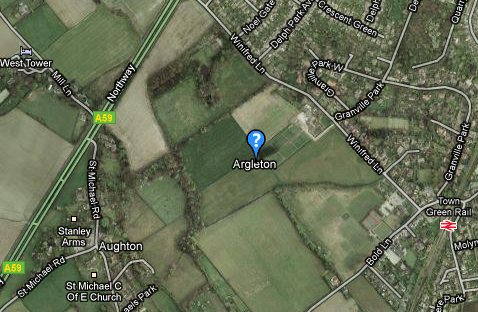Google Maps and the mystery of the non-existent town

A small village in the north of England, Argleton, has been causing confusion with an air of mystery. The simple reason is, is that the village simply doesn't exist except in the world of Google.
The above image is from Google Maps, displaying the village of Argleton, Lancashire, in the north of the UK.
The above image is from Bing Maps, displaying the exact same area but without any reference to Argleton in the map.
The above image is from the birds-eye view from Bing Maps, which shows an aerial, high-resolution image of the area, which I have stitched together (click to enlarge into full scale; warning: 7MB). As you can see, there is nothing but a load of fields and certainly no buildings, let alone a whole village in the area.
So why does Google display this village - which I'll point out now, categorically does not exist - and other mapping services don't?
Some believe that the added name is due to a measure to prevent copyright violations, but Tele Atlas provide the imaging and name data and have said they provide accurate information and Google deny that they have altered it in any way. It seems in this area, Google Maps is the looking glass to external information.
The local blogosphere is already taking advantage of this "Internet sensation" with this spoof site. Yet even after months of knowing about it plus users reporting it as an error, it still hasn't disappeared -- branding Google's mapping service as potentially inaccurate.
Mike Nolan, head of web services at Edge Hill University, wrote:
"I grew up in the area and spotted on the map one day that it said 'Argleton'," he says. "But it's just a farmer's field close to the village hall and playing fields. I think a footpath goes across the field, but that's all. The name 'Argleton' is similar to 'Aughton'. Maybe someone made a mistake when keying in the name?"
Yet the president of the Society of Cartographers, Prof. Danny Dorling, suggested that perhaps this was an additional element to a map to hide secret locations, as some may well be forced to do.
The only thing I can think of, and after trying out the name in an anagram solver which provided little except slight amusement, is that it's a tiny Easter egg which has taken all this time to discover.
